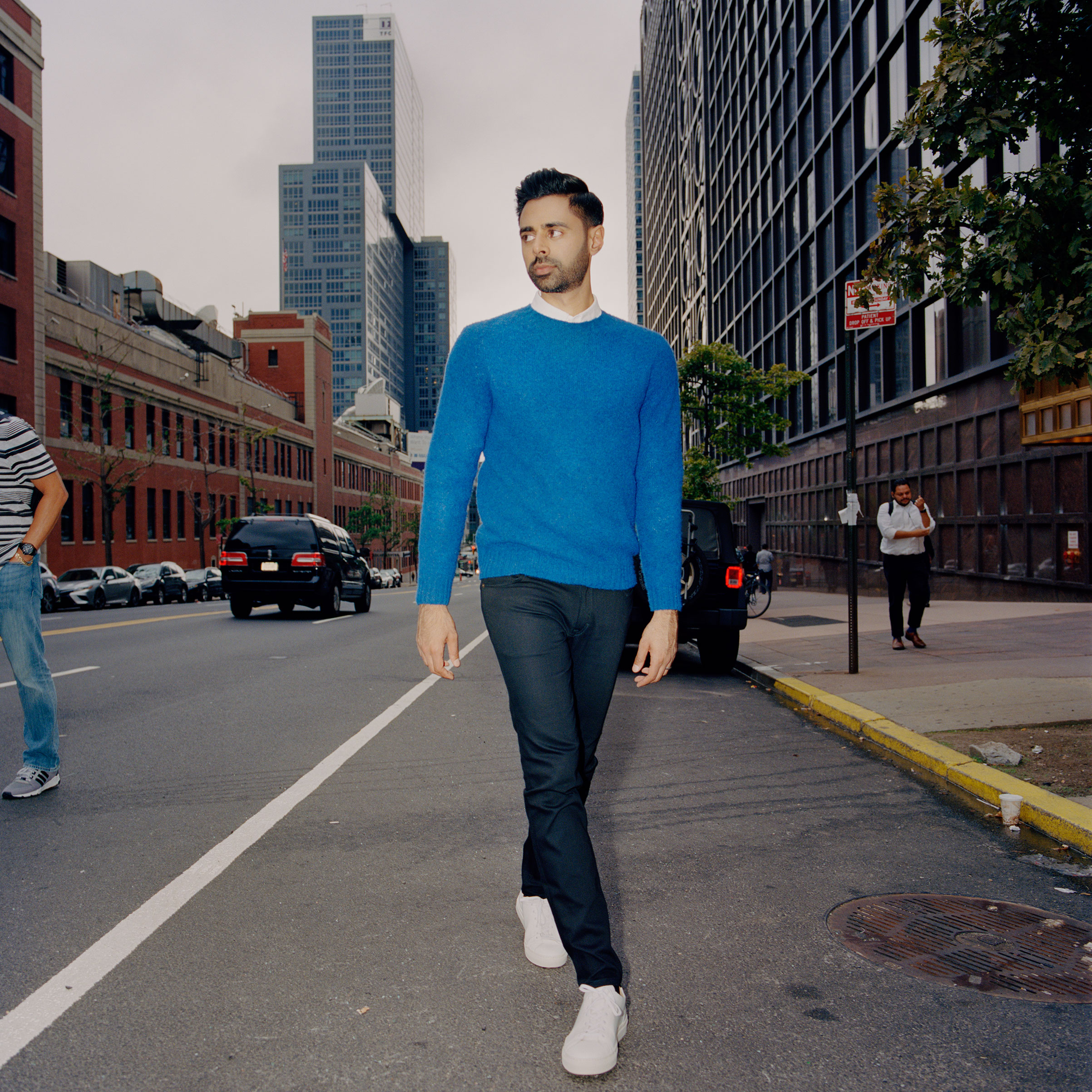It’s Hasan Minhaj’s 33rd birthday and his family has just arrived at his midtown Manhattan office to surprise him. His large staff crowds into the hall of the building, not far from the comedian’s old workplace, The Daily Show. They have spent the better part of their Friday evening honing jokes for Patriot Act, Minhaj’s upcoming political satire series on Netflix. The young comics and researchers vie for slices of Instagram-friendly cookies ‘n cream cake — when cut open, candy spills from the cake’s center. Someone gifts Minhaj a pair of Jordans with “Patriot Act” scribbled over them in bold, colorful font.
But the party can’t last for long: Minhaj has just arrived from an interview with a government official that will feature on the show, and he is already late for a scheduled call with Netflix executives. And then there’s the actual writing he needs to get done: Behind his desk, 57 neat notecards line a cork board, each listing a possible segment topic.
The subjects will remain secret until the show drops on Netflix on Oct. 28, but Minhaj has grand ambitions. He hopes to tackle large social issues like immigration around the world, the rise of conservatism in different countries, sports as a vehicle for political debate and climate change. The subjects skew more international than the average political show, in part because Netflix — unlike networks or premium cable channels — is available in 190 countries.
But Minhaj’s interests are also more wide-ranging than most American comics. “Some people look at the board of topics and go, ‘How is that going to relate to people here in America?'” he says, gesturing to the cards. “Stephen Colbert has never been asked, how are you going to relate to the billions of people with melanin on this planet?”

Since President Donald Trump took office, political satire shows have proliferated. But Netflix’s previous forays into the genre have often met quick cancellations, including The Break With Michelle Wolf. Minhaj believes his particular perspective will help Patriot Act stand out. “Historically, people with my identity across the world have been spoken for or spoken to,” he says.
Minhaj plans to break that pattern. His hour-long comedy special Homecoming King, which debuted on Netflix in May 2017, won him a Peabody Award. With the help of PowerPoint-esque visuals, he describes growing up as a first-generation Indian-American Muslim kid in Davis, Calif. He breaks up jokes with poignant meditations: Minhaj looks directly at the camera when he details how a date’s parents told him that he couldn’t attend the homecoming dance with their white daughter.
Minhaj has a particular talent for vacillating between the comic and the serious. It’s a method he employed at the 2017 White House Correspondents’ Dinner. After roasting an absent Trump and his staff, Minhaj ended his speech by quietly extolling the first amendment—pointing out no other country would allow a comic the right to make jokes about the president on such a platform. The performance won him name recognition and proved to television executives that he could tackle a show on his own. (He calls it is Rocky moment: everything to gain, nothing to lose.) Even talking in his office, he lulls his listeners with jokes. When he’s got them laughing, he carefully meets their eyes and drops uncomfortable truths.
There haven’t been many Indian-American comedians to reach Minhaj’s level of fame—and even fewer who openly talk about issues like Islamophobia in their work. He distinctly remembers the moment 2008 when a woman at a John McCain rally accused Barack Obama of being “an Arab,” to which the Senator replied, “No, he’s a good man.”
“All of my friends were like, that is is so honorable. But for me, as a Muslim American, I was like what if an Arab American had been watching this? The real answer should have been, ‘If he’s an Arab, so what?'” Minhaj says. “From then on, I’m just like, I’m not apologizing for who I am. I’m fighting for basic human respect.”
Minhaj became aware of his natural talent for comedy while competing in speech and debate at his California high school: “If I could make the judges laugh, I would automatically get 10 to 15 points higher on my score card.” Later, as a political science major in college, he realized that standup was basically speech and debate with jokes. He began sneaking out of his parents’ house at night in order to perform sets in San Francisco. Minhaj eventually caught the attention of The Daily Show. In 2014, he became Jon Stewart’s last hire before the lauded late night host left the series.
Minhaj plans to bring the narrative style of Homecoming King to Patriot Act, LED lights and all. “I made it very clear that I don’t want to be sitting behind a desk in front of a city skyline,” he says. “The moment people turned on their screens, they’d be like, ‘Oh, that’s Indian John Oliver.'”
Historically, audiences have turned to Netflix for bingeing, not appointment viewing. So instead of tackling weekly headlines, Minhaj will investigate evergreen political topics, like affirmative action. Rather than focusing on the headline-making lawsuit that alleged Harvard University discriminates against Asian students, Minhaj and his co-writers plan to analyze meritocracy more broadly: who gets what and why.
“I’m an insider and an outsider at the same time,” he says. “There hasn’t been a show like this because there haven’t been people who look like me in this space.”
- Why Trump’s Message Worked on Latino Men
- What Trump’s Win Could Mean for Housing
- The 100 Must-Read Books of 2024
- Sleep Doctors Share the 1 Tip That’s Changed Their Lives
- Column: Let’s Bring Back Romance
- What It’s Like to Have Long COVID As a Kid
- FX’s Say Nothing Is the Must-Watch Political Thriller of 2024
- Merle Bombardieri Is Helping People Make the Baby Decision